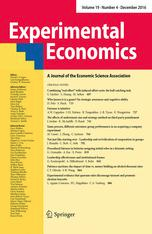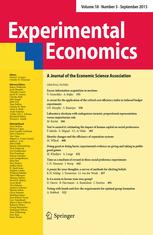 An economics journal has corrected a paper for the second time for failing to cite previous studies — and said in a separate note that it no longer plans to publish similar errata, with rare exceptions.
An economics journal has corrected a paper for the second time for failing to cite previous studies — and said in a separate note that it no longer plans to publish similar errata, with rare exceptions.
In September 2015, we reported on the first erratum for “Incentives for Creativity” — a paper that analyzed ways of inspiring creativity in the workplace — after it failed to cite relevant papers. One year on, the same paper has another erratum for a similar reason: not citing relevant papers from another field.
You don’t often see two errata for the same mistake — omitted citations — on one paper. Even less often do you see journal editors co-publishing a note saying they don’t plan on issuing any more such notices. Here’s an excerpt from the editor’s note in Experimental Economics: Continue reading We’re not “citation police:” No more errata for omitted citations, says economics journal
